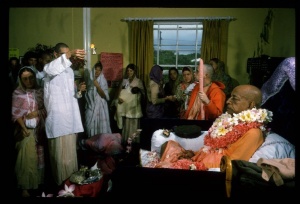CC Adi 17.195 (1975): Difference between revisions
(Vanibot #0027: CCMirror - Mirror CC's 1996 edition to form a basis for 1975) |
(Vanibot #0020: VersionCompareLinker - added a link to the Version Compare feature) |
||
| Line 2: | Line 2: | ||
<div style="float:left">'''[[Sri Caitanya-caritamrta (1975)|Śrī Caitanya-caritāmṛta (1975)]] - [[CC Adi (1975)|Ādi-līlā]] - [[CC Adi 17 (1975)|Chapter 17: The Pastimes of Lord Caitanya Mahāprabhu in His Youth]]'''</div> | <div style="float:left">'''[[Sri Caitanya-caritamrta (1975)|Śrī Caitanya-caritāmṛta (1975)]] - [[CC Adi (1975)|Ādi-līlā]] - [[CC Adi 17 (1975)|Chapter 17: The Pastimes of Lord Caitanya Mahāprabhu in His Youth]]'''</div> | ||
<div style="float:right">[[File:Go-previous.png|link=CC Adi 17.194 (1975)|Ādi-līlā 17.194]] '''[[CC Adi 17.194 (1975)|Ādi-līlā 17.194]] - [[CC Adi 17.196 (1975)|Ādi-līlā 17.196]]''' [[File:Go-next.png|link=CC Adi 17.196 (1975)|Ādi-līlā 17.196]]</div> | <div style="float:right">[[File:Go-previous.png|link=CC Adi 17.194 (1975)|Ādi-līlā 17.194]] '''[[CC Adi 17.194 (1975)|Ādi-līlā 17.194]] - [[CC Adi 17.196 (1975)|Ādi-līlā 17.196]]''' [[File:Go-next.png|link=CC Adi 17.196 (1975)|Ādi-līlā 17.196]]</div> | ||
{{CompareVersions|CC|Adi 17.195|CC 1975|CC 1996}} | |||
{{RandomImage}} | {{RandomImage}} | ||
==== TEXT 195 ==== | ==== TEXT 195 ==== | ||
<div class="verse"> | <div class="verse"> | ||
: | :'hari' 'hari' kari' hindu kare kolāhala | ||
:pātasāha śunile tomāra karibeka phala | :pātasāha śunile tomāra karibeka phala | ||
</div> | </div> | ||
| Line 18: | Line 17: | ||
<div class="synonyms"> | <div class="synonyms"> | ||
hari hari | hari hari kari'-saying "Hari, Hari"; hindu—the Hindus; kare—make; kolāhala—tumultuous sound; pātasāha—the king; śunile—if hearing; tomāra—your; karibeka—will do; phala—punishment. | ||
</div> | </div> | ||
| Line 25: | Line 24: | ||
<div class="translation"> | <div class="translation"> | ||
" 'Vibrating "Hari, Hari," the Hindus make a tumultuous sound. If the king [pātasāha] hears it, certainly he will punish you.' | |||
</div> | </div> | ||
| Line 32: | Line 31: | ||
<div class="purport"> | <div class="purport"> | ||
Pātasāha refers to the king. Nawab Hussain Shah, whose full name was Ālā Uddīn Saiyad Husen Sā, was at that time (A.D. 1498-1521) the independent King of Bengal. Formerly he was the servant of the cruel Nawab of the Hābsī dynasty named Mujaḥphara Khān, but somehow or other he assassinated his master and became the King. After gaining the throne of Bengal (technically called Masnada), he declared himself Saiyad Husen Ālā Uddīn Seriph Mukkā. There is a book called Riyāja Us-salātina, whose author, Golām Husen, says that Nawab Hussain Shah belonged to the family of Mukkā Seriph. To keep his | Pātasāha refers to the king. Nawab Hussain Shah, whose full name was Ālā Uddīn Saiyad Husen Sā, was at that time (A.D. 1498-1521) the independent King of Bengal. Formerly he was the servant of the cruel Nawab of the Hābsī dynasty named Mujaḥphara Khān, but somehow or other he assassinated his master and became the King. After gaining the throne of Bengal (technically called Masnada), he declared himself Saiyad Husen Ālā Uddīn Seriph Mukkā. There is a book called Riyāja Us-salātina, whose author, Golām Husen, says that Nawab Hussain Shah belonged to the family of Mukkā Seriph. To keep his family's glory, he took the name Seriph Mukkā. Generally, however, he is known as Nawab Hussain Shah. After his death, his eldest son, Nasaratsā, became King of Bengal (A.D. 1521-1533). This King also was very cruel. He committed many atrocities against the Vaiṣṇavas. As a result of his sinful activities, one of his servants from the Khojā group killed him while he was praying in the mosque. | ||
</div> | </div> | ||
Latest revision as of 16:12, 26 January 2020

A.C. Bhaktivedanta Swami Prabhupada
TEXT 195
- 'hari' 'hari' kari' hindu kare kolāhala
- pātasāha śunile tomāra karibeka phala
SYNONYMS
hari hari kari'-saying "Hari, Hari"; hindu—the Hindus; kare—make; kolāhala—tumultuous sound; pātasāha—the king; śunile—if hearing; tomāra—your; karibeka—will do; phala—punishment.
TRANSLATION
" 'Vibrating "Hari, Hari," the Hindus make a tumultuous sound. If the king [pātasāha] hears it, certainly he will punish you.'
PURPORT
Pātasāha refers to the king. Nawab Hussain Shah, whose full name was Ālā Uddīn Saiyad Husen Sā, was at that time (A.D. 1498-1521) the independent King of Bengal. Formerly he was the servant of the cruel Nawab of the Hābsī dynasty named Mujaḥphara Khān, but somehow or other he assassinated his master and became the King. After gaining the throne of Bengal (technically called Masnada), he declared himself Saiyad Husen Ālā Uddīn Seriph Mukkā. There is a book called Riyāja Us-salātina, whose author, Golām Husen, says that Nawab Hussain Shah belonged to the family of Mukkā Seriph. To keep his family's glory, he took the name Seriph Mukkā. Generally, however, he is known as Nawab Hussain Shah. After his death, his eldest son, Nasaratsā, became King of Bengal (A.D. 1521-1533). This King also was very cruel. He committed many atrocities against the Vaiṣṇavas. As a result of his sinful activities, one of his servants from the Khojā group killed him while he was praying in the mosque.